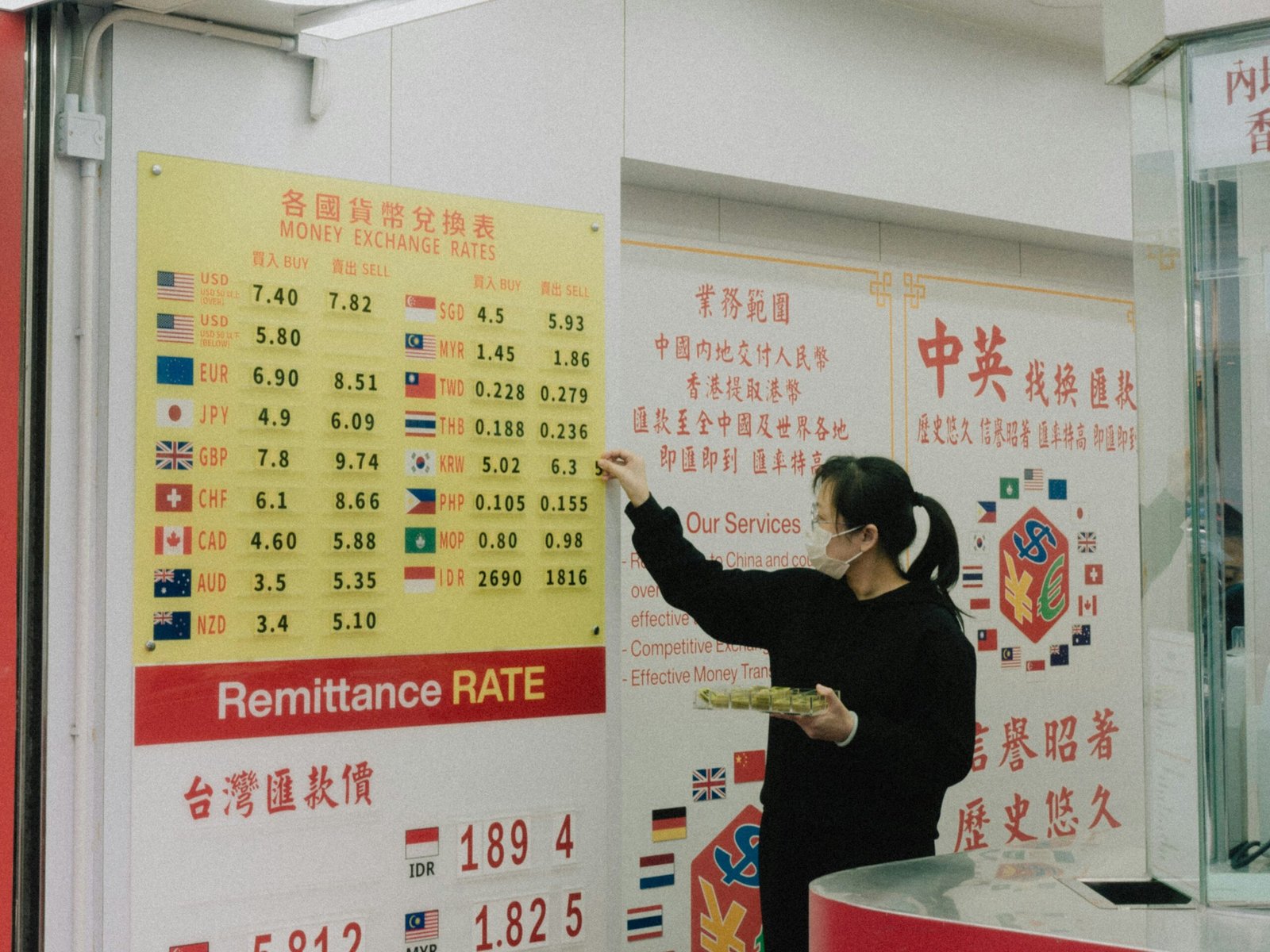
Understanding Currency Exchange Basics
Currency exchange plays a vital role in the global economy, serving as a mechanism that facilitates the conversion of one currency into another. At its core, currency exchange involves understanding exchange rates, which represent the value of one currency relative to another. These rates are not static; they fluctuate due to various factors, making it essential for individuals and businesses to stay informed.
The concept of exchange rates can be influenced by demand and supply dynamics in the foreign exchange market. When a currency is in high demand, its value typically increases relative to others. Conversely, if the supply of a currency exceeds demand, its value may decline. This principle applies not only to currencies but also to the broader economic indicators that affect them, such as interest rates, inflation rates, and trade balances. Understanding these elements is crucial for anyone looking to engage effectively in currency exchange.
Geopolitical events are another significant factor that can impact exchange rates. Political stability, economic performance, and government policies can cause fluctuations in currency values. For instance, a country undergoing political turmoil may see its currency depreciate due to reduced investor confidence. Therefore, staying abreast of worldwide events and their potential repercussions can empower individuals to make informed decisions when exchanging money.
There are various methods available for exchanging currency, including traditional banks, currency exchange kiosks, and online platforms. Each has its advantages and disadvantages regarding fees, convenience, and exchange rates offered. As one considers methods of currency exchange, it is vital to be aware of the associated costs and ensure one is obtaining the best possible rate. Understanding these currency exchange basics forms a foundation for successfully implementing smart hacks that can ultimately save money in the long run.
Choosing the Right Time to Exchange Currency
When engaging in currency exchange, the timing of your transaction can make a notable difference in the amount of money you ultimately save. Currency values fluctuate constantly due to various factors, including economic indicators, geopolitical events, and market sentiment. By understanding how these elements influence exchange rates, individuals can implement effective strategies to optimize the timing of their currency transactions.
One effective strategy is to closely monitor exchange rate trends over time. Various financial news websites and applications offer real-time tracking tools that allow users to observe currency fluctuations. For instance, platforms like XE or OANDA provide insights into the historical performance of currencies, helping users identify patterns and predict potential shifts in the market. Using these resources can empower individuals to make informed decisions and avoid unfavorable exchange rates.
Another useful technique involves setting up alerts through currency tracking apps. Many of these tools allow users to specify desired exchange rates, sending notifications when the rates become favorable. This means travelers or anyone involved in regular currency exchanges can act swiftly when the market is advantageous. Additionally, subscribing to financial newsletters or alerts can keep you updated on global economic events that might impact currency values.
It’s also beneficial to avoid exchanging currency during peak tourist seasons or major economic events when rates are often less favorable. Instead, planning exchanges during quieter periods can yield better results. Utilizing these methods, such as rate tracking and setting alerts, creates a proactive approach to currency exchange, ultimately saving money and enhancing the efficiency of financial transactions.
Using Online Currency Exchange Platforms
In today’s digital age, online currency exchange platforms have emerged as a popular choice for individuals and businesses looking to exchange currencies at competitive rates. These platforms provide a convenient and accessible way to manage currency transactions with minimal overhead costs. Popular services such as Wise (formerly TransferWise), Revolut, and CurrencyFair offer competitive exchange rates that may significantly outperform traditional banks. Each platform has its pros and cons, and understanding these can help users make informed decisions.
One of the primary advantages of online currency exchange platforms is their transparent fee structures. Unlike banks, which often levy hidden charges, many digital services explicitly state their fees upfront. For instance, Wise generally charges a small percentage of the transaction amount while providing mid-market rates, ensuring users get the best value for their money. Additionally, the user interface of these platforms is typically intuitive, facilitating seamless transactions for both novice and experienced users.
However, while these platforms offer attractive rates, it is essential to consider potential downsides. Some exchanges may impose limits on transaction amounts or require users to verify their identity, which can delay transactions. Moreover, the lack of physical branches means that customer support and assistance might be limited compared to traditional banks. Therefore, before committing to a platform, users should read reviews and compare rates thoroughly.
To secure the best possible rates and minimize fees, users should stay informed about market trends and consider using features available on these platforms, such as rate alerts. Setting up these notifications can provide valuable insights into optimal times for exchanging currencies. Overall, effectively utilizing online currency exchange platforms can yield significant savings, making them a worthwhile tool for anyone needing to conduct currency transactions.
Leverage Credit and Debit Card Benefits
When traveling internationally or making purchases in foreign currencies, leveraging credit and debit card benefits can significantly enhance your financial experience. Many financial institutions offer cards with favorable currency exchange rates, often considerably better than those available through traditional currency exchange services. The key to maximizing these benefits lies in selecting the right card and utilizing it effectively while abroad.
To begin with, look for cards that feature no foreign transaction fees. These fees, typically ranging from 1% to 3% of each purchase, can accumulate quickly and impact your overall budget. Some banks and credit unions provide travel-specific cards designed for frequent travelers, which not only waive these fees but also offer competitive exchange rates. Additionally, cards that provide rewards points or cash back on purchases can add additional value when making transactions overseas.
While the benefits of these cards are substantial, it is also essential to use them wisely. Always opt to pay in local currency instead of your home currency when given the option. This practice, known as Dynamic Currency Conversion, often results in inflated exchange rates, leading to higher costs. By paying in the local currency, you ensure that the conversion is handled by your bank at their favorable rates. Furthermore, setting up alerts for international transactions can aid in monitoring your expenditures and safeguarding against potential fraud.
In conclusion, leveraging the benefits of credit and debit cards can lead to significant savings when exchanging currency abroad. By carefully selecting the right card and adopting smart usage practices, you can reap the full advantages of currency exchange while minimizing associated costs. Always review the terms and rewards of your card and keep abreast of any changes to maximize your travel budget effectively.
Avoiding Common Currency Exchange Pitfalls
Exchanging currency is often an essential aspect of traveling or conducting international business. However, missteps in this process can lead to significant financial losses. One of the most common pitfalls travelers face is utilizing airport kiosks for currency exchange. While convenient, these kiosks typically offer subpar rates, in addition to imposing exorbitant fees. The markup on the exchange rate at airports can exceed that of local exchange services, leading to a less favorable deal overall.
Another trap to avoid is the use of vending machines for currency exchange. Similar to airport kiosks, these machines often come with hidden fees and inferior exchange rates that are not immediately evident to the user. It is advisable to conduct thorough research and find reputable currency exchange providers when needing to convert your money, rather than relying on machines or airport services that may not prioritize your financial interests.
Additionally, many travelers mistakenly wait until they arrive at their destination to exchange currency. While local exchange services might seem like a good option, they frequently charge higher rates due to limited competition. It is often more cost-effective to exchange some money before you leave or withdraw local currency directly from an ATM, which typically offers more favorable exchange rates, albeit possibly incurring foreign transaction fees from your bank.
To further safeguard your funds, always read the fine print when exchanging currency. Look out for additional charges or unfavorable rate conditions that could detract from your total. By remaining vigilant and informed about these common currency exchange pitfalls, travelers can protect their finances and ensure they retain more money during their exchanges, ultimately enhancing their travel experience.
Negotiate Currency Exchange Rates
Negotiating currency exchange rates is a valuable strategy that many individuals overlook. By leveraging negotiation skills, you can potentially save a significant amount on currency conversion fees, especially when dealing with local money changers or banking institutions. Understanding where and how to negotiate is essential in order to maximize savings during currency exchanges.
Local money changers often have more flexibility than large financial institutions when it comes to their exchange rates. When visiting these establishments, it is beneficial to engage in friendly conversation with the staff. Express your interest in exchanging a substantial amount, as they may be more inclined to offer you a better rate. Furthermore, conducting preliminary research on current market rates can empower you with the knowledge needed to make an informed offer. This practice not only showcases your awareness but can also lead to a more favorable deal.
When negotiating with banks, it is advisable to approach the situation confidently. Inquiring about their best available rates, or expressing an intent to exchange a larger sum than usual, can lead to better terms. Banks may have specific policies regarding their rates, but some banks might be willing to negotiate, especially if you demonstrate being a loyal customer or have accounts with them. Don’t hesitate to ask about any ongoing promotions or favorable currency exchange packages that may be applicable to your situation.
Additionally, timing plays a crucial role in negotiating currency exchange rates. Rates fluctuate frequently based on market conditions. Hence, being aware of these trends allows you to capitalize on better rates at opportune moments. Furthermore, maintaining a polite and respectful demeanor during negotiations fosters goodwill and can inspire the exchange personnel to provide a more favorable rate. Overall, by applying these practical negotiation strategies, you can effectively enhance your currency exchange experience and save money in the process.
Currency Exchange Apps You Can’t Ignore
In the fast-paced world of international travel and global business, efficiently managing currency exchange is essential. Thankfully, technology has provided us with numerous applications designed to streamline this process. These currency exchange apps not only assist travelers with real-time exchange rates, but they also help in locating local exchange locations. Here, we will highlight some of the most reputable currency exchange and conversion apps that are worth considering.
One of the most notable apps in this category is XE Currency. Renowned for its user-friendly interface, XE Currency allows users to monitor live exchange rates across various currencies. The app offers real-time updates, enabling travelers to make informed decisions regarding conversions. Additionally, XE Currency provides a feature that allows users to lock in preferred rates, thereby safeguarding against market fluctuations.
Another excellent option is Revolut. This app not only serves as a currency exchange tool, but it also functions as a digital bank, offering various financial services. Users can exchange currencies at interbank rates, which often results in better rates compared to traditional banks or exchange services. Revolut is particularly advantageous for frequent travelers, as it allows for international spending without incurring exorbitant fees.
For those seeking a more social approach, Wise (formerly TransferWise) is a remarkable choice. This app is well-regarded for its transparent fee structures and mid-market rates, ensuring users are not blindsided by hidden costs. Wise facilitates bank-to-bank transfers and currency conversions directly, making it a convenient option for both personal and business use.
In conclusion, leveraging currency exchange apps can significantly enhance your travel experience and financial transactions. By utilizing tools like XE Currency, Revolut, and Wise, users can stay informed and save money during their currency exchanges, ensuring a seamless financial experience while abroad.
Using Local Currency for Better Exchange Rates
When traveling abroad, utilizing local currency can significantly enhance your savings during currency exchange. One of the most effective strategies involves withdrawing cash directly from ATMs in the destination country’s currency. This method typically offers better exchange rates compared to traditional means such as currency exchange kiosks or banks, which often charge higher fees and provide less favorable rates.
ATMs tend to offer rates closer to the market value, allowing travelers to make the most of their money. However, to maximize savings, it is crucial to select ATMs that belong to major banks, as they are likely to impose lower transaction fees. Additionally, using an ATM that belongs to your home bank’s alliance can often yield better terms, as networks like Global ATM Alliance allow fee-free withdrawals.
Before embarking on your journey, it is advisable to inform your bank of your travel plans to avoid any issues with accessing funds while abroad. While withdrawing cash, aim to avoid opting for dynamic currency conversion, which provides the option to see prices in your home currency at the point of withdrawal; this service often incurs additional fees that can be detrimental to your budget.
In selecting ATMs, look for those associated with well-known institutions as they are more likely to provide transparent fee structures. Furthermore, consider withdrawing larger amounts at once to minimize the frequency of transactions, as each withdrawal may be subject to fees. Maintaining a careful budget and monitoring your expenses in local currency can also prevent overspending.
Ultimately, utilizing local currency through ATMs not only enhances the value of your funds but also grants you a more authentic travel experience, allowing for seamless transactions within the local economy. This approach embodies a practical and efficient method to navigate currency exchange while traveling abroad.
Conclusion: Implementing Currency Exchange Hacks
As we have explored throughout this blog post, smart currency exchange hacks can significantly impact your financial outcomes, especially when traveling or conducting international business. By utilizing various strategies, individuals can avoid unnecessary fees and optimize their currency exchange rates, ultimately leading to substantial savings. The importance of strategic planning cannot be overstated, as it allows individuals to make informed decisions that are crucial in maximizing their financial health.
One effective approach is to stay informed about the prevailing exchange rates, understanding that these rates fluctuate constantly due to market conditions. By timing your currency exchanges to coincide with favorable rates, you can enhance your budget for travel or other international transactions. Additionally, leveraging online tools and apps can provide real-time information on exchange rates, allowing for immediate action when the rates are in your favor.
Another key strategy involves researching different currency exchange providers. Not all providers offer the same rates or fee structures, so comparing options is essential. By choosing providers with lower transaction fees or better exchange rates, individuals can substantially improve their overall financial situation when converting currencies. Furthermore, looking into peer-to-peer exchange platforms can save significant amounts compared to traditional banks or exchange kiosks.
Lastly, utilizing credit and debit cards with no foreign transaction fees can be beneficial when making purchases abroad. Such financial products not only offer convenience but can also enhance your overall savings by providing competitive exchange rates without incurring additional costs.
Implementing these currency exchange hacks can transform how individuals handle their financial transactions across borders. Through savvy planning and research, significant savings can be achieved, ultimately leading to more enjoyable and financially sound experiences when dealing with currency exchange.








